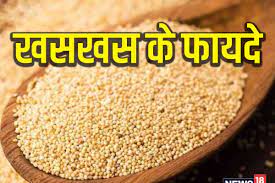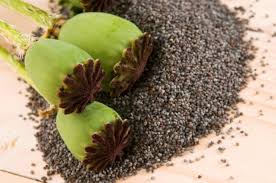Khus khus/Afim/Poppy For Health- Nature’s Tiny Powerhouses-2023
Khus khus/Afim/Poppy For Health
Poppy seeds are made from the opium poppy plant (Papaver somniferum), which is referred to as “Khus khus” or “Afim” in different parts of the world. For generations, traditional medicine and cooking have utilized these little, kidney-shaped seeds as a main ingredient.
Let’s examine , the Khus khus/Afim/Poppy For Health, nutritional value, Ayurvedic applications, growth circumstances, origins, and possible advantages and disadvantages of poppy seeds.

Growth conditions and origins for Khus khus/Afim/Poppy :
Although native to the Mediterranean region, the opium poppy plant, which yields poppy seeds, is now farmed all over the world. It needs a moderate temperature to grow at its best and does best in well-drained soil. Turkey, India, and the Czech Republic are among the nations where poppies are widely grown.
Climate:
Cool to temperate regions are ideal for poppy plants to flourish. For the duration of their growth, they need moderate rainfall and like well-drained soil. Opium poppy adaptation to different climatic circumstances and hardiness are well-known traits.

Follow Our Digiknowledge.co.in Page for Latest update about Bikes, Cars, Sports, , Life style and many more.
The nutritious composition of Khus khus/poppy seeds
The nutritious composition of poppy seeds is quite impressive despite their small size. They provide an abundance of
- Protein: Required for the growth and repair of muscle.
- Dietary fibre helps to maintain a healthy digestive system and controls bowel motions.
- Fats that are good for monounsaturated and polyunsaturated fats.
- Vitamins: Like niacin, folate, thiamine, and vitamin E.
- Minerals: Zinc, phosphorus, magnesium, and calcium are among them.

Applications in Ayurveda of Khus khus/Afim/Poppy Seeds :
Poppy seeds are known for their calming effects in Ayurveda. They are thought to calm an overabundance of Pitta dosha and have a cooling impact on the body. Poppy seeds are suggested by Ayurvedic practitioners because of their ability to reduce inflammation and excess heat in the body.
What are Benefits of Khus khus/Afim/Poppy Seeds:
- Digestive Health: Dietary fibre from poppy seeds promotes healthy digestion and helps avoid constipation.
- Poppy seeds are occasionally used as a sleep aid because of their relaxing qualities.
- Rich in nutrients: rich in vitamins and minerals, two important nutrients.
- Source of Healthy Fats: A good balance of healthy fats is provided by the seeds, which promotes general wellbeing.
- Poppy seeds have antioxidant qualities that aid in the body’s defence against oxidative stress.
- Mood Enhancement: There are certain chemicals in poppy seeds that may have a slight uplift in mood.
- Poppy seeds, being high in minerals like calcium and phosphorus, are known to promote bone health.
- Benefits for the Skin: By reducing oxidative damage, vitamin E from poppy seeds promotes healthy skin.
- Anti-Inflammatory: According to Ayurvedic customs, poppy seeds may reduce inflammation.
- Energy Boost: The protein makes up a steady supply of energy.
- Management of cholesterol: Poppy seeds’ good fats may help keep cholesterol levels within normal ranges.
- Weight Loss: By encouraging satiety, the protein and fibre levels can aid with weight loss despite their high calorie density.
How to eat Khus Khus ?
The seeds of Khus Khus can be eaten raw, ground into a paste and mixed into milk, or steeped in hot water to form a tea. Khus Khus can be drunk on a daily basis.
Drawbacks of Khus khus/Afim/Poppy Seeds :
- Contamination Risk: If ingested in significant amounts, poppy seeds may be contaminated with opium alkaloids, which could be harmful.
- Addiction Potential: Opium is derived from the opium poppy plant, and overindulgence in it can result in dependency.
- Reactions to Allergies: Certain people may experience allergic reactions to poppy seeds.
- Drug Interactions: Caution is advised since poppy seeds may interfere with some drugs.
- Caloric Density: Although high in nutrients, poppy seeds are high in calories, and consuming too many of them might lead to weight gain.
- Constipation Risk: Although they are high in fibre, consuming too much of them without enough fluid intake might lead to constipation.
- Mild Sedative Effect: Although this may be helpful for sleep, it might not be for people who need to be alert.
- Avoid large Poppy Seed Consumption: Pregnant women are frequently cautioned against consuming large amounts of poppy seeds due to possible effects on the central nervous system.
- May Cause Drowsiness: Poppy seeds have a relaxing effect that may cause some people to feel sleepy.
Note :-Restricted in Some Regions: Possession and usage of poppies seeds may be prohibited by law in some countries / Areas.
Warnings and Adverse Reactions of Khus khus/Afim/Poppy Seeds :
- Hypersensitivity Reactions: People who are allergic to seeds should be careful.
- Avoid ingesting excessive amounts of sedatives right before tasks that call for attentiveness.
- Pregnancy: Due to possible effects on the central nervous system, pregnant women should see a doctor.
Conclusion:
Poppy seeds, with their rich nutrient profile and diverse uses, offer both culinary delights and potential health benefits. However, it’s crucial to be mindful of potential disadvantages, especially in cases of allergies or interactions with medications.
Moderation and informed consumption can help individuals harness the nutritional advantages of these tiny powerhouses while minimizing potential risks.
Note :-Always consult with healthcare professionals for personalized advice based on individual health conditions and considerations.
Does khus khus increase weight?
With roughly 28.13 grammes of carbohydrates in 100 grammes of poppy seeds, khus khus is likewise heavy in carbohydrates, which aids in weight gain.
Is khus good for skin?
As a natural exfoliant, khus khus works toremove blackheads and dead skin, use a scrub made from a paste of Khus Khus combined with yoghurt. A fantastic moisturiser is Khus Khus. Because the seeds feed the skin, it’s an excellent treatment for dry skin.
Is khus good for hair?
Utilising Khus root hair oil on a regular basis can aid in reducing hair loss and encouraging the development of new hair. Dandruff and other scalp ailments respond well to khus root hair oil as well. Because of the oil’s antibacterial qualities, the scalp is soothed and inflammation is decreased.




